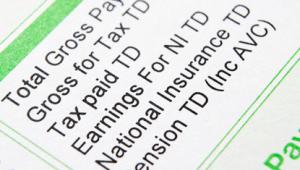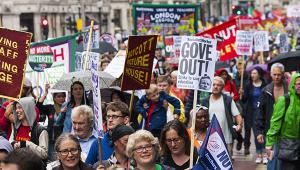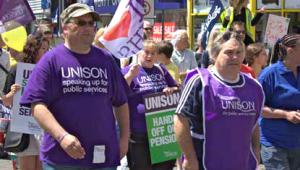Unison, Unite, the GMB, the National Union of Teachers, the Fire Brigades Union and the Public and Commercial Services union have united in a day of action and are staging rallies and protests up and down the country. Members of the Northern Ireland Public Service Alliance are also participating, as are some Transport for London members of the RMT.
Highlighting that real incomes were down by more than £2,000 since 2010, Trades Union Congress general secretary Frances O’Grady said public sector workers must not be ‘locked out of the recovery’.
She said: ‘Across the public sector workers are on strike today to say enough is enough. Year after year pay has failed to keep up with the cost of living.
‘Nearly half a million local government workers earn less than the Living Wage. But even as the economy starts to grow, ministers have told them that the pay cap will last until at least 2018.
‘This is why today’s strikers deserve public support. They are saying that ordinary workers should not be locked out of the recovery, and that we should all get a fair share as the economy grows again.’
Unison general secretary Dave Prentis said his members had turned out in force.
‘The picket lines were out early across England, Wales and Northern Ireland in a massive show of solidarity, sending a clear message that 1% is not enough,’ he said.
‘It is disgrace that more than 400,000 local government and school support workers are paid less than the Living Wage and one million earn less than the coalition’s low-pay threshold of £21,000.’
NUT general secretary Christine Blower said teachers’ morale was at a low ebb following moves to introduce performance-related pay in schools and delay the pension age to 68.
‘The fact that teachers are prepared to take strike action is an indication of the strength of feeling and anger about the government’s imposed changes,’ she said.
‘The profession is on its knees. Strike action is a last resort but, due to the intransigence of the coalition government, it is one which we cannot avoid.’
But the Cabinet Office said the majority of workers had turned up to work and almost all key public services were being delivered as normal.
'In past years, unions made inflated claims about how many they thought would participate in strike action. They were shown to be wrong,' a spokesman said.
The Cabinet Office confirmed that only a fifth of civil servants (fewer than 90,000) are on strike, all 717 Jobcentres opened this morning, the majority of schools in England and Wales are open, fire services are operating across the country and nationally, disruption to local government services is minimal.
Speaking at Prime Minister’s Questions yesterday, David Cameron said the strikes were ‘not right’.
‘The National Union of Teachers is proposing a strike based on a ballot it had almost two years ago, on a very small turnout of its members,’ the prime minister said.
‘Really, is it right to continue with this situation when the education of so many children is going to be so badly disrupted?’





















